#what evils have to be rejected and what they represent--and how characters and the world suffer from those evils--as well as how the whole
Text
Disney, releasing Wish: "so it's all about legacy--the new generation surpassing the old, overcoming the evils perpetuated by them, relinquishing singular power... and there's an old man in a tower, uh... animal sidekick, i guess..., ah... magic...?
Miyazaki, just out of frame, sledgehammer raised:
#the boy and the heron#not tagging wish 'cause i'm being a little acidic#this isn't to be negative in the slightest--I really respect both films--but it's interesting to see how visceral boy+H gets with its story#what evils have to be rejected and what they represent--and how characters and the world suffer from those evils--as well as how the whole#'rejecting' part goes. in terms of animation powerhouses discussing their legacies - disney and miyazaki both - I find it interesting that#one makes a pretty safe and nostalgic movie about imagination and dreams; the other is a long trudge through the land of the dead.#b+h is a hard watch - and a look at the legacy of a man questioning his whole purpose in the world - after his cultural touchstones#have long passed by. Mahito needs to understand his grief to keep living--but if he drowns in it he'll just continue the cannibalistic and#violent world of his granduncle. how the hell do you make art when the trauma of your entire life has colored it forever? How can anyone?#maybe after a while... it's time to detonate that damn tower and keep living.#this is to say#if you have enough money to make whatever you want#Make It Fucking Count
647 notes
·
View notes
Text
Sydcarmy & Beauty and The Beast
So, The Bear is a story with many themes and messages in it. The process of creating a story a lot times is just frankenstein-ing other stories and elements you like plus your owned lived experience.
I don't really remember how I started thinking about it, I do remember it was like 3am so that definitely has something to do with it, but I started thinking about Beauty and The Beast. And then I started comparing certain elements of it with The Bear. And then I started reading the Wikipedia page for Beauty and The Beast. And then I looked at the clock and it was like 4am so I was like okay, I should sleep now actually.
I did notice a lot of interesting similarities between the two, so I wanted to compare some of them in this post here. I think it's a really interesting lens to look at the story of The Bear from.
Chapter 1: The Beast
So, while it would be cool to do some kind of role reversal with the two romantic leads, this story does not do that, and the obvious parallel for Carmy is The Beast.
Rundown of The Beast's character traits, via wikipedia:
"In the original tale, the Beast is seen to be kind-hearted for the most part, and gentleman-like, with only an occasional tendency to be hot-tempered. Disney's interpretation of the Beast made him more constantly angry and depressed, due to the shame from his unkind actions which led to his transformation, and particularly his struggle of reconciling his hideous appearance with his inner humanity which made him feel hopeless about breaking the curse. Supervising animator Glen Keane describes The Beast as "a twenty-one-year-old guy who's insecure, wants to be loved, wants to love, but has this ugly exterior and has to overcome this." Upon his reform under his love interest Belle, his personality changes to refined and more even-tempered, while naive about the world at the same time."
Obviously this isn't to shame JAW's appearance, he's a pretty attractive dude, I'm looking more at the personality traits here.
The Disney version of him is way more unhinged and animal-like, which I'm not sure perfectly fits Carmy, but I feel like the insecurity, anger and depression is pretty accurate.
I don't think the "beast" element is entirely irrelevant, however. Let's think about what the namesake of the show is: The Bear. In reference, or course, to the main family having the last name Berzatto. They do also refer to each other as "Bear."
It's Cousin Michelle who makes the connection between the Berzattos and literal bears:
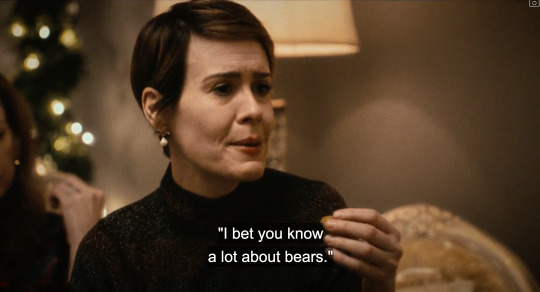
When she mentions this quote someone had said to her.
Stevie likens the Berzattos to bears later on in this episode:

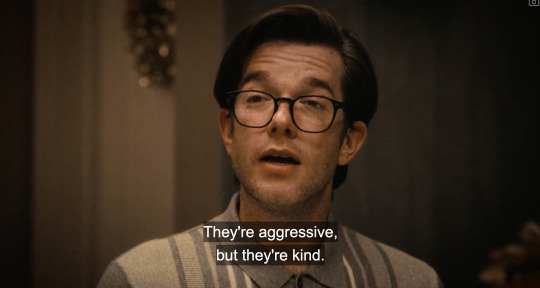
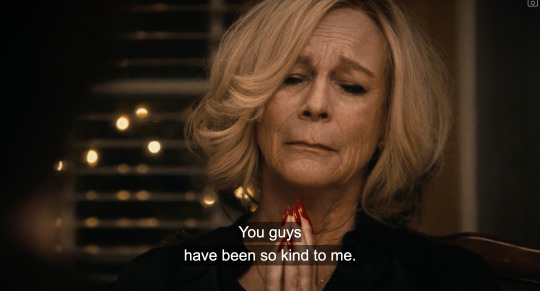
It's pretty clear that the Berzattos = bears. Aggressive, but also kind and emphatic.
I also want to talk about the very first scene of The Bear:
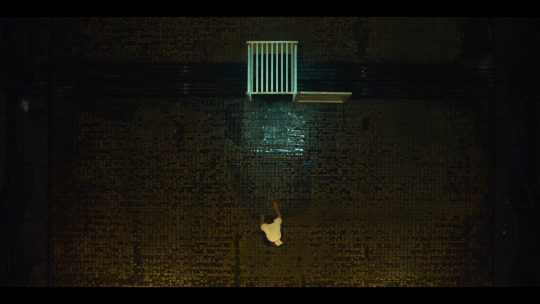
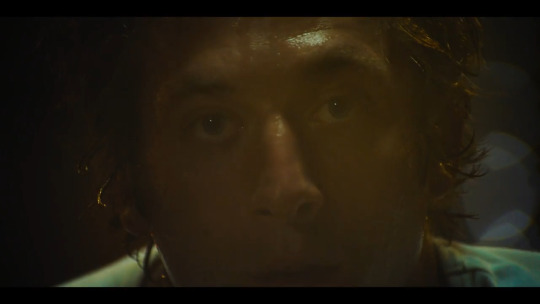
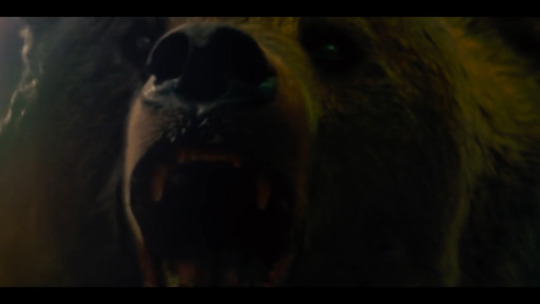
Carmy is letting the bear out of it's cage, walking slowly towards it. He says "I know" to the bear, trying to calm it, or maybe trying to empathize with it. The bear growls and attacks him, and he wakes up from the nightmare.
It's clear that the caged bear represents something in Carmy. His rage, his stress, his grief. And he can't control it, it escapes and it consumes him.
Backstory of The Beast, extremely paraphrased:
Disney version: A prince is spoiled, cold-hearted and extremely selfish. He's transformed into a hideous beast as punishment, and told he won't transform back unless he earns the love a beautiful young woman.
Fairytale version: The prince's father died before he was born, and his bio mother leaves him in the care of an evil fairy godmother. Things get weird and incesty, this was the 1700s ig, the godmother tries to seduce the prince when he's an adult. He rejects her and she curses him to become a beast and says the curse won't be broken until he receives a maiden's act of true love. There's then a lot of really irrelevant fairy-lore and other stuff that I don't really want or need to get into.
I feel like evil mother figure one might be more accurate? Especially because Donna's one of the people who gave him so much trauma that he still carries with him? Generational trauma and addiction is "a curse" in a way.
Chapter 2: The Beauty
So it's very clearly Sydney.
Beauty in the OG fairytale doesn't have a super interesting personality outside of "pretty, caring and kind." so I think we'll look more at the Disney version here:
"While the studio wanted Beauty and the Beast to resemble an old-fashioned film, the writers envisioned Belle as "a woman that was ahead of her time"."
"... the screenwriter conceived Belle as a headstrong feminist to avoid creating another "insipid" Disney princess."
"Beauty and the Beast's story department was predominantly male. Woolverton often argued with the more traditional story artists over Belle's role and personality, but continued to be supported by Katzenberg and lyricist Howard Ashman, the latter of whom also lobbied for "a thinker and a reader" who "wasn't a victim"."
So, Belle was basically a strong and independent woman for Disney at the time. I wanna hone in more on these character traits they mention specifically.
Sydney is very intelligent, even an overthinker at times. She literally shows up to, like, week 2 of work with a full book written on how the business can be improved.
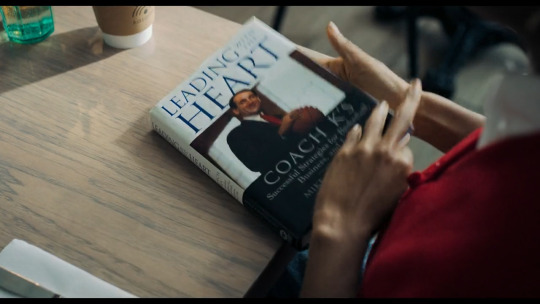
We know she's a reader. Not only from the coach K book, she also mentions lending Marcus books at some point.
I also think Sydney fits the "not a victim" criteria. Sydney is shown pretty consistently to stand up for herself and fight back in situations.

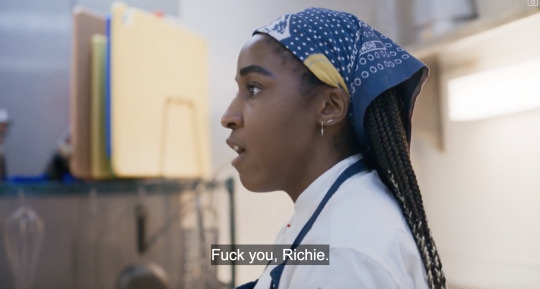
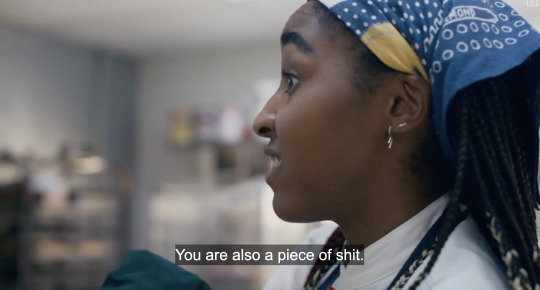
On Beauty's backstory:
In every version of The Beauty and The Beast, Beauty's a daughter to a widower (much like Sydney is.) Beauty has many siblings, most notably her evil older sisters. They are omitted from the Disney version, and Belle is an only child.
In the Disney version, Belle is well known for her beauty, but looked down upon for not conforming to more traditional feminine roles.
Being a headstrong woman of color in the very white and male dominated world of fine dining, I can see how she fits this.
Her father has doubts about her career as a chef, she has had bad experience with chefs in leadership positions before, and the crew of The Beef really looks down on her at the beginning of the series.
Chapter 3: Beauty and The Beast
So now let's talk about the actual relationship of the Beauty and The Beast.
Belle/Beauty is lured into The Beast's castle because her father is being held captive inside. And interestingly....
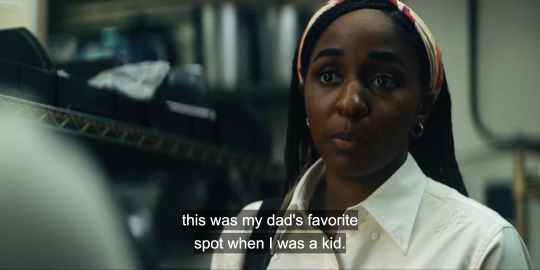
Sydney references her father as the reason for why she applies for The Beef.
In the fairytale, The Beast is immediately smitten with Beauty and asks her to marry him every day. That would be a very obvious HR violation in The Bear, so I think it might be better to look at the Disney version of this story.
So in the Disney version, The Beast is more annoyed that Belle and her father showed up at all, but he does know she's a pretty woman and allows the release of her father so she will be his prisoner instead.
Their relationship is pretty bad at first, like you'd expect a captor and prisoner relationship to be, but he does allow her a nice lavish room. He orders her to have dinner with him, and she refuses to leave her room to protest against him.
Carmy and Sydney were friendly at first meeting, but after The Stock Incident, their cracks really start to show. It's when Sydney really stands her ground and argues back at him. This is not the end of the arguments and tension between them.
Belle and the Beast end up getting in a fight when Belle snoops around his room. He yells at her more loudly this time, and Belle flees the castle on horseback. She gets attacked by a pack of wolves and The Beast saves her. She takes him back to the castle and nurses his wounds.
This to me matches with the final fight Sydney and Carmy have in season 1. Carmy displays the worst of his anger, and it causes Sydney to want to wipe her hands with him completely. She grabs her stuff and leaves, telling him she's quitting.
She comes back when he apologizes to her, and they have a real bonding moment when they decide to open a restaurant together.
The Beast and Belle start to have a better relationship after The Beast heals. They become more friendly, The Beast more docile, and they're both really happy for the first time in the film. There's a scene where The Beast shows Belle the castle library and tells her it's hers.
I think the equivalent would be seeing Carmy and Sydney plan the menu together. In those scenes they seem less like co-workers and more like friends. You can also tell it's one of the few things they get actual real enjoyment doing.
I think the main parallel I see for this relationship is how Carmy and Sydney improve each other. Like with Belle and The Beast, you can actually see Carmy learn how to better handle conflict and communicate more efficiently when he's placed with Sydney.
He's more vulnerable. He apologizes more. He's able to better control his temper.
There's two very concrete examples of Sydney being able to help stabilize his emotions, actually.
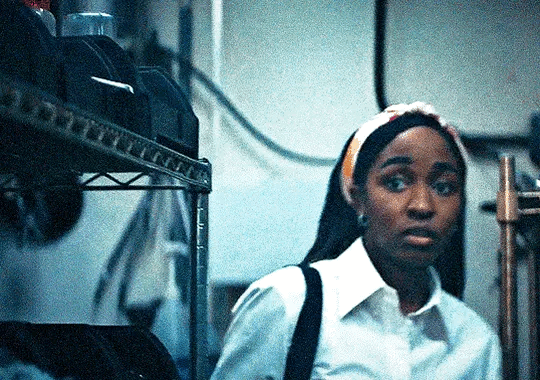
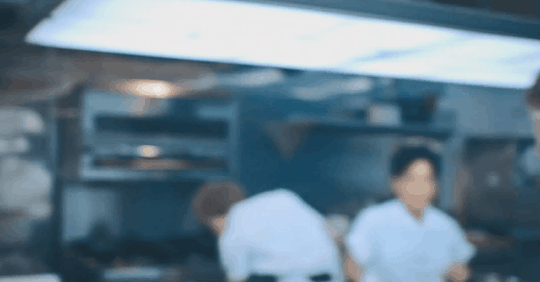
Sydney is quite literally "taming the beast" in Carmy. Cognitive behavioral therapy would also achieve that, but Carmy is too much of a workaholic to attend a session, so Sydney will have to do for now. They didn't have CBT in 1700s France, either, unfortunately.
I will also say that this isn't a 90 minute Disney movie, so the slow-burn will be slow-buring for awhile until we get to the actual conclusion of the fairytale.
Chapter 4: Gaston
so I have two characters in mind for this role: Richie and Marcus. But def more heavy on Richie than Marcus.
Gaston is a villain made exclusively for the Disney movie. Here's some description for him:
"In direct contrast to his adversary the Beast, Gaston is depicted as physically handsome with an unattractive personality, both physically and emotionally embodying hypermasculinity. "
"Gaston has been generally positively received by film critics, as his lack of "magic power or political influence" means that his villainy tends to resonate with audiences who often identify someone similar to him in real life, although critics regard him as a less memorable villain than some of the studio's previous efforts."
"The Huffington Post described early drafts of Gaston as "a weaselly, sort of wimpy character." In fact, Gaston was originally intended to resemble more of an annoying than antagonistic character,"
So I think Richie kind of fits the "hypermasculinity" thing, in terms of some of his mindset and sexist behaviors.
Richie, for at least the first season, really looks down on fine dining as a concept. He makes fun of Carmy and Syd for their background in it and makes snide comments about it whenever possible.
Gaston also looks down on Belle for liking books, and encourages her to live a more "simple" life with him instead.
Here's a really interesting parallel I found with these two:
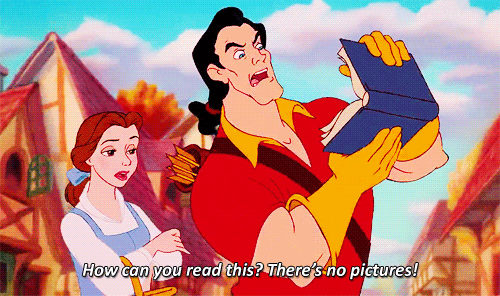
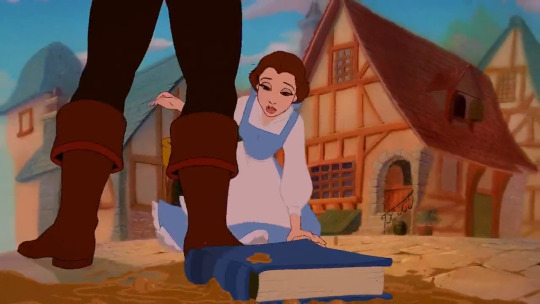

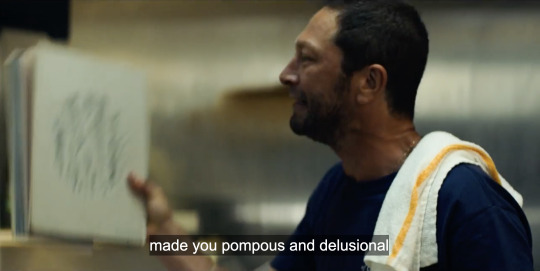
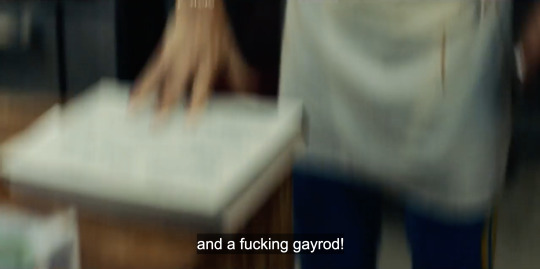
Making fun of the main character's book and then throwing it away? In the intro of the story? Very interesting.....
As far as the similarity with Marcus: it begins and ends with Marcus and Gaston both having unrequited feelings for the main female protagonist.
Other than that, Richie is way more Gaston coded in the grand scheme of things. Just not as evil. I feel like he gives first-draft Gaston with being "More annoying than antagonistic."
Chapter 5: What about Claire?
I see Claire fitting into this as almost like a faux-Belle. The love interest that's supposed to "fix" the main protagonist, but something doesn't work.
Again, there's two scenes I wanna look at specifically to showcase this:
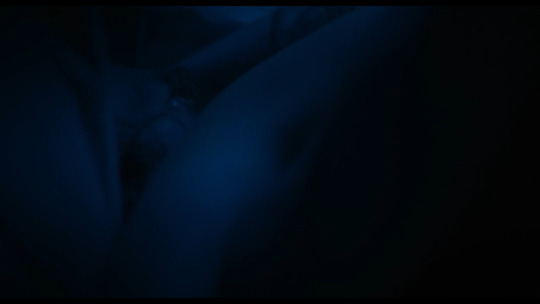
This reaction shot of Carmy. This is the last shot of the sex scene, and there are some other previous shots of the sex scene overlaying this at times. But I've been wanting to do a deep dive into it for awhile-- why have this shot? What's the purpose of it?
I think that this shot clearly tells us that Carmy is either pensive and/or dissatisfied with what has happened. Laying with his eyes open and just staring at the wall, deep in thought, possibly regretful. This isn't the expression a man who's just had sex with a pretty woman usually has. This is one of many clues that this relationship isn't something that he really wants or enjoys.
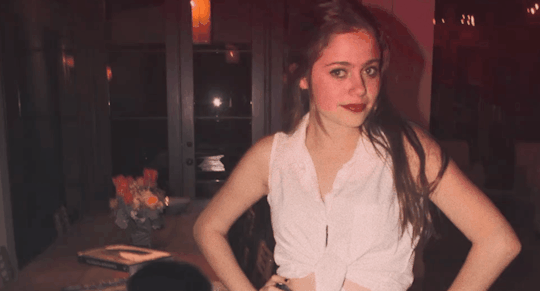
Aaaand, the panic attack scene again. If Claire was his "true love", she would be able to quell his anxiety and panic, if this whole "beauty and the beast" story arc I'm putting together is to be believed.
Claire is the perfect girl. She's pretty, smart, talented. His family loves her. She loves him. But she does nothing to fix his problems. Because it's not true love.
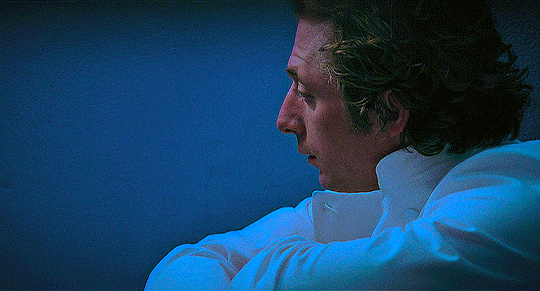
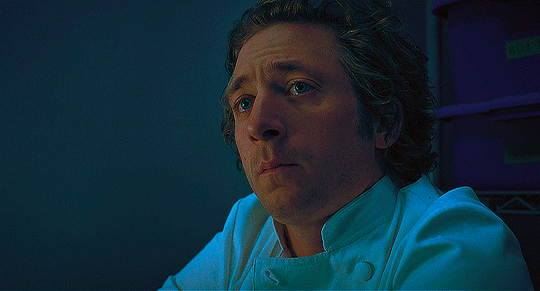
Carmy not being happy at the thought of Claire vs Carmy cracking a smile because he looks at containers of radichio + fennel, ingredients Sydney cooked him once.
It is ABUNDANTLY clear that his feelings for Syd help his mental state in ways his feelings for Claire do not. Because what he feels for Sydney is closer to true love.
Conclusion:
Am I saying Christopher Storer took the plot beats and characters 1 for 1 from Beauty and The Beast? No, obviously not. Am I saying that maybe he sat down one day and this movie was on and he was like "hey maybe i can do something with this"? Possibly!
This is just speculation at the end of the day, but I really loved looking at all the possible connections between these two things. Tell me your thoughts on all of this: cool interpretation or am I just talking out of my ass?
#thank u for reading all of this if u did because holy shit#this is a long one#the bear meta#sydcarmy#anti claire bear
54 notes
·
View notes
Text
Why TOH really doesn't want a theme of discrimination.
Every demon in the show is depicted as evil, dumb or as good... because they don't want to be a part of demon culture.
That's the thesis and it's not an over exaggeration. In the main cast, the only demon of the DEMON REALM is Hooty who is treated as slow, less intelligent than the other members of the cast, and as a joke by the writers as he never elevates himself above being simply comic relief. Association with him seems to be the earliest sign that Lilith is meant to be seen as a joke and her relationship with Hooty ostracizes her from the rest of the cast. Makes her appear weird because she's the only one who can like the bird tube.
Otherwise, they're all antagonists. Most of them are just one note villains for that matter. In S1, every demon with a real speaking role is a villain. The monster hunters, Warden Wrath, Tibbles, the basilisk, the publisher for King and even Boscha if her third eye denotes demonic heritage. Anyone who we see at least as neutral are pretty much just background characters. The ones from the prison in the first episode are really the only ones who get a moment of heroism.
Now you might say: What about Bat Queen? She's the richest person on the Isles and she... Isn't a demon. She's a palisman. Made by, or at least for, a god with the insinuation they give. Bare minimum: Not for any demon known to the Isles. So she doesn't count.
There ARE witch antagonists in S1 thankfully. They're Matt, who goes on to obviously be a good person at heart, Amity who... Duh and Lilith who is also redeemed. None of this happens to any of the demons though even if ostensibly this is their world since the entire dimension is named after demons.
Which, as a note, also is part of why saying TOH is anti-colonial means ignoring an entire race.
Even KING, who should have been the demon representative in the main cast, was then retconned not to be one. Worse yet, only once that retcon began did the show start treating him with any real respect. As a demon... He was just a dumb comic relief character as far as the show is concerned.
So when we FINALLY get a reoccurring demon... It's Kikimora. That should be all I need to say there.
Now the final argument: Vee. Vee is a good person, right? She's not a villain or antagonist, just a good person. And you would be right. The framing on Vee is the problem. As the ONE genuinely just good demon, we have to evaluate how she is different. She is different... Because she rejected the Demon Realm. Her parallels with Luz are even supposed to make it clear that she is better at being a human THAN LUZ. Which has the awful implication, if we want to say TOH has anti-discrimination theme, that the only good demon, is a domesticated demon. One who wants to be a human.
That's. Fucking. Awful.
And just to cover my bases: Yes, discrimination is more than a race thing but the concept of discrimination on race is actually pretty much the only one ever brought up. The fact that no one gives a shit about ethnicity or sexuality or gender actually hurts the theme because you have to project those things onto the show instead. And any allegory to discrimination is explicitly done through races. Fantasy races but that still frames it as a racial issue so its theme on anti-discrimination is going to struggle to branch out beyond racial lines because it effectively ignores that any other form of discrimination might even EXIST.
And for the finale!... I don't think any of this is on purpose by the writers. Yes, they bring discrimination into the show but just like how real life conflicts will often ignore the complexities of all the groups present, such as us referring to all Native Americans as one whole group rather than their separate tribes and histories, the show effectively forgets about the demons. They're just there for flavor because if literally all of the characters of the demon realm were elves, it wouldn't feel like it fits the name at all. It adds spice to a scene and adventure if you have demons of all sorts and sizes.
But the witches are the conventionally attractive characters who are easy to latch onto and so they are the main cast. Everything that looks other becomes a target for villainy because of that juxtaposition. Unfortunately, none of this helps any sort theme of inclusivity. That we are supposed to look past the outer shell and see the person within, regardless, race, gender, sexuality, etc. like that.
Instead, TOH tells a very basic fantasy story and in doing so, falls into the fact that a lot of classic fantasy was written by racist white dudes and the fact that the term demon is charged due to LOTS of religions that paint them out as wholly evil. Without actually interrogating these concepts, it can be easy to fall into them.
So yeah, I think this is a theme people need to stop trying to apply to TOH.
======+++++======
I have a public Discord for any and all who want to join!
I also have an Amazon page for all of my original works in various forms of character focused romances from cute, teenage romance to erotica series of my past.
I have an Ao3 for my fanfiction projects as well if that catches your fancy instead.
If you want to hang out with me, I stream from time to time and love to chat with chat.
A Twitter you can follow too
And a Kofi if you like what I do and want to help out with the fact that disability doesn’t pay much.
80 notes
·
View notes
Note
This is not a request or anything, but I think Fyodor or Jouno would like someone Younger and/or inexperienced than them(not necessarily a minor but yk) so that they can shape their perception of a relationship and what pleases them. Or what do you think? [:
This is probably gonna be long, but I have a lot of thoughts about that (and this isn’t proofread and I just woke up, so I apologize in advance for typos/other errors or my thoughts making no sense).
Fyodor
(First of all, I also have many different versions of Fedya in my own imagination, so I’m not criticizing how other people write him at all! I think everyone views a character a little different and interprets their canon actions and behaviors differently, and that’s okay.)
Fyodor is represented as very dominant, undeniably toxic and controlling in many fics, especially smut, and I can imagine him to be like that, but on the other hand…that description doesn’t suit canon Fyodor’s fully. On the one hand, I can imagine him to like a “sit still, look pretty, do nothing and please me” partner, but he canonically values independence (see: his “super happy chit chat about our problems” with Dazai in Meursault), people with a similar mind to his (see: somewhere in the dead apple guide book), and asagiri said he would give his s/o a country for white day. And I think he likes people he cannot predict and read, anything else would bore him.
So: I personally think he values a partner with an individual personality, who’s on the same wavelength as him, and keep up with him in a way. However, I’m not rejecting the idea of Fyodor liking a partner that he can corrupt and mold, it might not be compatible with my own headcanons, but it just suits him in a way. When it comes to writing my own fics, I like dark content and could even create plotlines where Fyodor would be just as ruthless and doesn’t mind a minor, but canon Fyodor most definitely wouldn’t. a) he’d be terribly bored, and b) he might be a terrorist and do all sorts of evil/immoral things, but grooming or worse seem like thinks he wouldn’t approve of.
To answer your question now, depending on how seriously he loves said partner, and that he would even have one, I can see him liking someone younger he can corrupt and mold, not because he’s evil but because it gives him a sense of control. And he wouldn’t shape his partner to a someone who completely lacks autonomy, has no own opinion and only lives to please him. I think he would still value an intelligent and independent partner, but in some ways (like in bed, or when it comes to serious decisions or his own goals), I believe he would prefer if he doesn’t need to meet them halfway but for them to agree with him and support what he does. In addition to that, I think he would like someone younger because they’re less “tainted” by the world, more innocent and pure, etc. than most adults.
(And now a little smutty “porn without plot” headcanon: yes, he’d like a younger, innocent partner who would likely do anything he’d ask of them, and if they wouldn’t, then it would be easy for him to talk them into doing it and even managing to make them like whatever it is he asked of them. He’d love someone younger than him who doesn’t question what he does and who has no experience with relationships that they can compare theirs to. Everything he does seems normal to his s/o, even if it isn’t, and Fyodor shamelessly takes advantage of that.)
Jouno
Once again, I think Jouno values partners who are on the same wavelength as him, but he also wouldn’t want to make a genuine effort to change for a partner or work on his own behaviors if they bother someone, so it would be so much easier to be with someone who doesn’t question him or make demands— he’d rather have someone he can shape into what he wants to avoid conflict and discussion. And he canonically loves praise, so being with someone younger than him would likely result in his partner to idolize him and put him on a pedestal, which I think he would like a lot.
#bungou stray dogs#bsd#there’s always a smut version and a sfw version of a character in my imagination#the smut version is usually not strictly based on canon facts#and the sfw one is a little more realistic#chit chat#anons<3#fyodor dostoyevsky bsd#bsd fyodor#bungou stray dogs jouno#jouno bsd#bsd smut#🐀#🐾
58 notes
·
View notes
Text
The demonic bargain of the Storm
I think that the most accurate interpretation of Max's nightmare in general and the character of Other Max in particular is that it symbolizes an internal struggle of Max against her fear, self-doubt and self-loathing. I think that interpretation most likely corresponds to what the writers intended and is most firmly rooted in the game.
Having said that, I think there's also a different interpretation that fits the events of the game quite well. Not a psychological, but a metaphysical interpretation of Max's nightmare and the final choice. In which Other Max is not just a figment of Max's mind and the Storm is not just a meteorological phenomenon. Rather, they are both facets of an independent, conscious and malicious entity. An entity of the kind that we usually call demons.
Now, one might say that a demon would be out of place in Life is Strange. Would it really be, though? In Season 1 and BtS there's plenty of metaphysical events already.
Max's reality bending power that despite the best efforts of Max, Chloe and Warren cannot be explained away using "chaos theory". Chaos theory could only be used to explain the reverberating effects of rewinding time. But it most certainly doesn't explain how Max is manipulating time with a flick of her wrist.
Rachel's fire and/or wind based power, which was only teased and never thoroughly explored, but definitely seemed to escape any rational explanation.
Numerous sightings of various "spirit animals".
Rachel's ghost, in the form a doe, guiding Max to Rachel's grave.
Chloe's visions of William, which may have been just nightmares, but may also have been her communing with the dead.
The blue butterfly, which may have been a guardian angel, or another spirit animal, or something else entirely, but most certainly wasn't just an insect.
Life is Strange has always had a strong undercurrent of spiritualism and mysticism. Just listen to one of Samuel's talks.
So with all that already present in the game, is a demon really that far out?
Let's imagine that just like Samuel said, there's a powerful spirit lingering in Arcadia Bay. However, that being is anything but benevolent. You could call it a demon, you could call it a vengeful local deity. Maybe it has always been always hostile. Or maybe it is just a reflection of the hearts and souls of Arcadia Bay's dwellers. And as the dwellers became more and more hateful, cruel and greedy, they tainted the town's spirit too, making it malevolent.
Whatever it was and however it came to be the way it was in October of 2013, the spirit had acquired a taste for evil.
And the dwellers of Arcadia Bay provided a steady supply of it. Sadists kidnapping and tormenting others for their sick "art". Bullies driving others to the brink with their hatred. Drug dealers preying on minors.
But evil acts done by evil people quickly become predictable. Boring.
And that's when Max came back to town. Someone unique. Someone with a beautiful heart. Full of love, strength and courage, even if Max herself didn't realize it yet.
Just like Jefferson wanted to turn the "innocence" of his victims into "corruption", to taint, despoil, contaminate, brand them, the spirit wanted to do the same to Max. It wanted to empty her heart of love. To break her strength. To replace her courage with doubt. And that would be achieved by tempting Max, the genuinely good, kind and well-meaning person, into commiting the worst sin of all.
In the interpretation I'm proposing, the final choice represents Max being tempted to sin. The sin she is being tempted to commit is the rejection of love. Just like love (both romantic and platonic) is the root of everything good in the world, the rejection of love is the ultimate sin, in which all other sins are contained - hatred, greed, cruelty, disdain. Max is tempted to reject Chloe's love, to take back her own love, to erase it, to make it so that it never even happened.
One could say it's unfair to maintain that sacrificing Chloe would be a sin on Max's part, because she would do it to save the town. But that's the whole point! Temptation is not about presenting someone with a choice that is obviously evil, both at its core and at the surface. Temptation is about presenting someone with a choice that is evil in its essence, but is dressed up as something else. Usually it's dressed up as something alluring, something pleasurable.
But the best kind of temptation (and by "best" I mean the most insidious and most effective) way of tempting is to present something evil as something that would lead to "a greater good". To present something evil as a "necessary evil". To make someone consciously commit an act of evil by inducing in them a mistaken belief that there's no other way forward but to commit this act of evil.
That's precisely what Max is being tempted with. She is told to become an "everyday hero". To save her hometown. But to do that, she must commit the ultimate sin - reject love. This is truly a demonic bargain.
In my mind, by tearing up the photograph, Max defeats her tempation. She sees through the rotten, sadistic deal she has been offered. She chooses not to commit an act of evil. Rejecting love and friendship, taking back the hope you've given someone, leaving them to die alone, abandoned and afraid - it's always an act of evil. Always a sin. No matter what it would accomplish on the physical plane.
There is no such thing as a necessary evil. EVIL IS NEVER NECESSARY. And a lesser evil is evil still. You are only responsible for the things you choose. So if you choose evil, you are responsible for it. Even if it's a lesser evil, even if you've deluded yourself into thinking that it's a necessary one.
If you're presented with a choice to stop a greater evil at the cost of commiting a lesser evil and you refuse to do so, that doesn't make you responsible for the greater evil. On the contrary, it shows you chose no evil at all.
20 notes
·
View notes
Text
Okay but seriously though, I love how Kaschey and Kal’tsit’s different forms of immortality represent the systems and ideas that they live and perpetuate.
Kaschey’s immortality as depicted in Chapter 8 is emblematic of the cycle of abuse. He moves from body to body with the words “One day you will despair, and in that moment you will become me.” He relies on crushing the egos of his host bodies until they no longer wish to live, taking over completely and denying the person that the host originally was just like how abuse moves through generations, the same evil underneath different eyes and minds, inflicting pain to prepare its path forward.
Kaschey does all this because he is pathetic and weak. He is not strong enough to force anyone to go against their own will if they resist him, so he must torture them until they let go, until they’d rather someone else live their lives.
And once they do, he uses the person they originally were. He takes their name, he wears their face, he uses their powers and connections, their bodies, to live, seeking his next victim as he does.
He would take a child, because a child is easy and moldable. Even if she has a spirit unlike his own and rejects his teachings, he just needs the ideas to be there, festering in her mind until the real world will do the rest of the job. Kaschey and Talulah are just like every child that swears they would never be their parents, and yet in moments of great stress or despair, rage and scream like they did because it’s what they know.
And it doesn’t matter that he’s dead, that Talulah killed him with his own sword, because he’s there inside Talulah, whispering his lessons over and over into her ears, waiting for her to let him in.
That’s why he’s afraid of psychics. He tries to have Ines killed in Darknights Memoirs when he realizes she could see his shadow inside Talulah. He is also caught off guard and put into high alert when Amiya calls for him by name. The Deathless Black Snake has survived for eons by not being perceived—a different name and face every time, different powers, different decades/centuries/millennia. Textually, he fears Amiya because he fears the might of the old Sarkaz kings. Thematically, he fears someone who could see him for what he truly is, a set of living, sentient, hateful ideals.
Anyone who sees him normally hates him can only hate and destroy the face he wears, such as Wei Yenwu with the Duke Kaschey. Someone that sees him and calls him by his real, ancient name though? They make the Deathless Black Snake more than someone’s shadow. They could make him “real”, they might even make him bleed.
Kal’tsit’s life on the other hand, shows the enduring nature of humanity itself. It is just her. Her own unchanging name, face, freak biomechanical body. She is cold in demeanor and (impenetrable in diction) from the agony of living for thousands of years in a hell world, but even all that trauma can’t stop her bleeding heart from helping others.
The only thing about Kal’tsit that changes is her role in the stories of other people. There’s a reason why A Walk in the Dust showed three (and hinted at a 4th) different storylines with different characters: a young genius made to confront that his talents were used for war, a raging widow seeking vengeance on her lover’s killers, a rich baron of a provincial town trying to hide his neighbors from an oncoming political storm. In these, Kal’tsit is a guide, a co-conspirator, an adviser. She’s also a doctor to a girl with a cold, deep in the Ursus tundra.
The reason for this is that Kal’tsit’s life is lived in the exact opposite of The Deathless Black Snake. She goes from era to era, helping others become the people they could be, changing her role depending on what they need. She does not discriminate nor think once about her own status (“I’m surprised someone like you would go all this way for a girl with a cold”), and she’ll do it even if the path the person wishes to take is ultimately self destructive such as Liliana’s quest for vengeance (Kal’tsit warns Folinic’s mother that this is suicidal, but helps her anyway when she sees the latter’s mind is set), her own life lived purely to assist in the lives of others.
(Side note - This is also why she acts as the mother figure to many in Rhodes Island.)
Kal’tsit lives this life so selflessly and completely that her own will does not matter at all in Arknights. Amiya rescues the Doctor against her vote. Liliana would attempt to assassinate Count Boris with or without her. She brings The Doctor to Theresa’s Babel despite her warnings to Theresa that this was not a good idea. She wishes to avenge Theresa by killing the Doctor, but refrains from doing so because Theresa made her promise to protect both Doctor and Amiya no matter what. She appears in Under Tides for the sole purpose of taking Skadi and Gladiia’s place in Iberian prison.
Even with the Baron in A Walk in the Dust, the one who says “I am your fat fowlbeast awaiting its slaughter”, he is willing to sacrifice himself under Kal’tsit’s orders because Kal’tsit is carrying out his wish to protect his town, particularly his friend and his friend’s daughter, since he is just a spoiled, dimwitted rich man who cannot do this himself.
In a way, the Deathless and Kal’tsit are both inhuman. One is a set of living, self-perpetuating fascist ideals whose sole goal is to ensure that Ursus always lives by the rule of force, the other is an old, enduring machine with the sole purpose of helping people live their lives beyond how they could on their own.
...And then there’s the rapper penguin in a Tupac shirt.
793 notes
·
View notes
Text
The Disastrous Life of Saiki K. - Superhero Roundtable
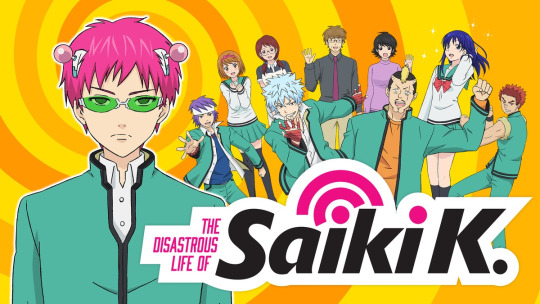
How do structural mythology, cultural studies, and cultural history reflect the series’ world and world-building around superheroes?
The Disastrous Life of Saiki K centers on the titular character, Saiki K, a highschool student with Superman-esque levels of psychic power. He has trademark pink hair and must wear green glasses and antennae in order to limit his powers. Saiki, as one of the only actual psychic characters in the anime, actually doesn’t want to solve problems, or help anyone with his powers, and most of the show he uses his powers to minimize attention and keep to himself. His only really widespread use of power was changing everyone in the world’s hair color to also be colorful so that he doesn’t stand out as much. In direct opposition to Saiki’s nonexistent need for attention and immense psychic power, his classmate Kaidou, has no power whatever but claims to be The Jet-Black Wings, the only person standing against The Dark Reunion, an evil organization running the world behind the scenes. This is played for satire as Kaidou loudly brags about being the Jet-Black Wings and blames every mishap on the Dark Reunion, wears red bandages on his arms to “control his power,” and a dramatic action song “Judgement Knights of Thunder” plays everytime he does anything.
youtube
Saiki K is a comedy anime satirizing the idea of a “superhero” through Saiki K, who kind of sucks and doesn’t care that much about other people, but even in using his powers selfishly, ultimately helps the people around him. This show challenges the idea that superheroes would necessarily swing to complete good or complete evil, and makes fun of those ideas in the example of satirizing binary thinking through Kaidou’s fake enemy, The Dark Reunion. Although the show begins with Saiki K doing everything he can to avoid attention and making friends, he warms up to his classmates over the show and uses his powers for their benefit, even as he convinces himself he’s just trying to help himself.
The origination of manga in Japan was influenced by the globalization of American comics, including superhero comics, brought during WWII. Interestingly, as members of the Axis Powers, Japan and Japanese characters were featured in American superhero comics as enemies to the nation, often depicted as racist stereotypes for wartime propaganda. On an international scale, superheroes are associated with the US, as a national export and national representation of American might and power. This can be seen in superhero anime like My Hero Academia, where All Might represents the All-American superhero figure. Shows like Saiki K and Mob Psycho 100 have superhero-like characters and themes but distance themselves from calling them that, positioning themselves as psychics rather than superheroes.
In what ways are the superheroes and their abilities informed by their racial, gender, sexual, and cultural identities?
Saiki K definitely participates in the de-racialization of characters as Will Bridges spoke to in “The Past Tense and the Future Perfect,” which we read for Cowboy Bebop. All of the characters are assumed to be Japanese, and are very homogeneous in appearance, save Nendo, whose butt-chin and weird mohawk are played for laughs. In many ways, Saiki represents the ultimate hegemonic male character who is conventionally attractive, cishet, middle class, and extremely able bodied. The only way that Saiki represents “other” could be through his lack of romantic or sexual interest in the show, much to the chagrin of Kokomi, the self proclaimed queen of the school, who appears with a halo of light around her at all times and has caused multiple stampedes of men chasing after her. The character Kaidou, who isn’t very popular with his classmates (somewhat because he always talks about the Dark Reunion), could be acting out social rejection through his fixation on being a superhero fighting evil, above the social dynamics of highschool.
In what ways do costumes and concealing identities further separate the superheroes from normal society? How necessary is it for the superheroes to hide their true identities to successfully achieve their goals?
For Saiki, hiding his identity is his goal. To this end, he has changed everyone’s hair in the entire world to be colorful so that he doesn’t stand out. When the school has a sports test in gym class, Saiki has to tone down his supernatural speed and strength to blend in, including teleporting a ball back when he throws it so far that it can’t be seen, and squeezing a grip strength monitor so hard that that needle goes all the way around and it looks like he has an average score. For many superheroes, putting on a costume/disguise is necessary to carry out their goals, but for Saiki, his physical appearance is connected to his supernatural abilities, and the antennae and glasses he wears serve not to express his powers or his superhero role, but rather to minimize and control them.
How do the economic, political, and social events that occurred during the series’ creation and broadcast cultivate and inform the superheroes’ decisions and actions?
The Disastrous Life of Saiki K first appeared as one-shot manga chapters published from 2012-2011, then serialized in Weekly Shonen Jump from 2012-2018. The anime based off of this manga was aired from 2016-2018. I think Saiki K intentionally builds off of the context of preexisting superhero media to satirize it, questioning the characterization of other characters with superpowers as good and selfless or evil and self-serving- Saiki is literally just some guy and he doesn’t feel any pressure to use his powers for anyone. The anime creates a depoliticized superhero- he isn’t connected to any hero organizations or governments, he doesn’t have any enemies. He is so depoliticized and inactive as a superhero figure that his morals swing all the way around into questionable because he is so powerful, and could solve so many problems, but only changed everyone’s hair.
How do the superheroes question themselves, each other, and their obligations and duties to the people around them?
Saiki K as a show challenges the superhero trope of questioning their purpose, sense of self and obligation to others by making Saiki antisocial and feel pretty neutrally about everyone besides himself. He always ends up helping the people around him, even when he doesn’t mean to, often doing so because it’s the easiest way to avoid being exposed, or not taking action will negatively impact him in some way. In one episode, he watches a magician on TV being locked in a box, and when it seems like he won’t be able to escape in time, Saiki teleports onto the set to save him. He does this in order to save the magician from a deadly incident which could potentially delay the rest of the tv channel, including Saiki’s favorite mystery show that after the magic show. He does help people, but his obligation is (allegedly) to himself first.
@theuncannyprofessoro
20 notes
·
View notes
Text
When I Have You ~ Colors, Finale (Kai Parker Fanfiction)
Hello, my dear readers! I've been having a roller coaster of a summer on a personal level. In order to get through the last few twists and turns, I finally completed the last chapter of Colors, my Kai Parker Soulmate AU Fanfiction.
This is NOT meant to be read as a standalone piece. Events of the story and even the universe it is set in vary greatly from the original show. If you haven’t yet, please read the Details post and previous chapters linked on this masterlist.

*not my gif
Word Count: 1,477 (excluding recap)
I don’t like writing with Y/N in the place of character names, but this IS a reader insert fanfiction. I use Rosalie Wilson as a placeholder. Use Rose/Rosalie as a substitution for Y/N.
Warnings: None, really! I hope you enjoy reading this chapter as much as I've enjoyed writing it :)
Recap of Chapter 11:
“Come with me.” With a gentle voice, Rose held her hand out to him. Kai took it, following behind her obediently. They went down the stairs and through the back door, standing in front of a big willow tree. Malachai watched as she knelt on the ground, using a garden tool to dig into some pile at the base of the tree.
“Rose, what are you–” His voice stopped abruptly. Malachai was no longer a siphon, but he had been one long enough to feel the unimaginable power emanating from the ground. Rosalie lifted this dirty, half-burnt hummingbird toy from the ground.
In complete silence, she stood again, placing it into his hand. With tears in her eyes, Rosalie gave him the greatest gift of all. One drop slid down her cheek. Malachai brushed it away as the sun’s first rays of the day washed over them.
“You shouldn’t have to lose anything.”
~
The frayed hummingbird toy felt heavy in Malachai’s hand. Beyond what it was, this tiny thing represented the darkest moments of Rosalie’s life. Entrusting him with the magic that terrified her – giving him the powers that tormented her – was the grandest form of faith.
Kai couldn’t explain what he was feeling. A sob crept into his throat, making it impossible to say a word. In the early sunlight of the day, they both stood silently. They looked at each other and at the symbol of Rosalie’s past between them. More minutes ticked by. It was as if time itself had decided to slow, understanding the gravity of what had occurred.
As one who’d been rejected by his family and the whole world, as one who knew the pain of hating themselves unyieldingly, Malachai knew what he had to do. Taking Rose’s hand, he placed the object she was so desperate to be rid of in her palm.
Her eyes widened, and her initial instinct was to discard the evil Kai was giving her. Before she could, Malachai wrapped his arms around her, trapping the toy between their chests.
With a gentle voice and a soothing kiss to her temple, Kai began to explain himself. “Just listen to me, love. Come with me.” Taking her hand, Malachai took her to the porch swing and made her take a seat before joining her.
The hummingbird toy had fallen to the ground. Rosalie curled her feet up under her instinctively, maintaining her distance from it. Her own magic disgusted her beyond belief. Kai said nothing for a few moments; he just watched Rose shy away from the most genuine parts of herself.
He kneeled in front of her, looking into the gorgeous, shining eyes he adored so much. “I can’t tell you how much it means to me… you trusting me with this…” He took her hands, encasing them in his own. “I know what this symbolizes for you. It’s something you’ve wished you could get rid of, something that weighs you down wherever you go.
“I lived the same way for decades. I despised what made me who I was with a burning passion, and it manifested itself in the way I treated others.” Rosalie’s expression flickered between her own shock and empathy for the man she loved. Kai smiled tenderly in return, rested his warm hand against her soft cheek, and ran his thumb under her eye to catch one stray tear.
“You taught me how to love others. You were the first to forgive me, even when I hadn’t forgiven myself. When I have you, I need nothing else. What kind of soulmate would I be if I didn’t help you heal in the same ways you’ve helped me?”
After a few seconds of meaningful silence, Kai placed the hummingbird containing Rose’s magic next to her on the porch swing.
“I cannot accept this, but I think you should. Reclaim what makes you who you are, and I will be here for you.” Rosalie said nothing in response, and Malachai didn’t expect her to. What he was asking of her was perhaps the most daunting challenge she would take on.
He sat with her on the porch swing as the sun made its way up into the sky. Kai’s arms wrapped around her shoulders as she leaned into him, silently processing his words in her own time. Many minutes had ticked by before Rosalie sat up. With a grateful but hesitant kiss to Malachai’s cheek, Rose picked up the object of her deepest anguish.
“You’ll stay with me?” Her voice quivered. With one touch, memories of the pain she’d caused and the pain she’d endured swam through her mind. She could barely feel Kai’s hand as it smoothed her hair in comfort.
“Every step of the way.”
~
It took months before she was ready, but with Malachai’s support, Rosalie finally reclaimed her magic. Along with it came the heart-wrenching emotions she’d felt that night. They made her crumble to her knees and stole the air from her lungs. Kai stood beside her, his hand hovering right over her shoulder. He was just about to help her stand when a beam of eerie red light shot from her palm, setting the grand oak tree in the backyard ablaze.
Kai quelled the flames quickly, taking a deep breath. “It’s okay. It was an accident.” Rose bit the inside of her cheek so hard she drew blood. The metallic taste coated her tongue, and she swallowed it back bitterly. “It was an accident the last time, too. That doesn’t make it okay.” Kai pressed his lips together, silencing his instinctive quip. If harming her family on accident wasn’t okay, how was what he had done even remotely acceptable? How had she forgiven him? How had he forgiven himself?
In Malachai’s silence, Rosalie realized the impact of her words. “Kai…” He smiled half-heartedly, shaking his head. “Don’t worry about it.” She stood, closing the distance between them with just a few steps. Kai stared at the ground, and when Rosalie made him lift his chin to look at her, he didn’t flinch away. Perhaps her magic would always scare her, but it would never scare him. He loved her too much, just as much as she did him. They would never hurt each other, not even unintentionally.
Their eyes met, and Malachai leaned in to press his forehead against hers. Nothing more was said, the silence eventually broken with a soft apology from Rosalie. “I’m sorry. I didn’t mean to hurt you.” Pressing a kiss to her temple, Kai reassured her that he was fine. He had some wounds to heal from, some that may never fill, but this wasn’t about him.
“Focus.” He came to stand behind her, grasping both of her hands in his. “Breathe with me.” Her eyes closed, and she followed Kai’s every instruction. “Find your magic within you. Don’t fear it. It is not here to hurt you or anyone else.” His fingers laced into hers, giving her the strength and support she needed without her needing to ask. “Let it flow through you. Watch it course through your veins like water. Let it become one with you.”
A few seconds later, Kai watched as their feet left the ground. He beamed with pride, allowing her to feel the power she had. “Open your eyes, Rosalie.” Malachai’s lips brushed her ear as he whispered to her. Rosalie gasped as her eyes fluttered open. They were floating five feet in the air, watching storm clouds cover the sun. “You did it.”
In complete control, Rose brought them back to the ground. Thunder crashed above them as she threw her arms around Kai’s neck. Malachai had succeeded in returning the kindness she’d bestowed on him; she was no longer afraid of herself. The rain came down harshly, pouring where there had just been sun. Neither of them cared as their lips met. “I love you, Malachai.”
“I’m so proud of you, love.”
~
Eleven years later…
“Bye, Mom!”
Rose waved her son off as he clambered into the back of Alaric’s van. Alaric was taking Lizzie and Josie to a waterpark and Asher insisted on tagging along with his cousins. “Have fun and be safe! Listen to your Uncle Ric!”
In the backyard, Kai was setting up an inflatable pool for the twins. Both were jealous their brother was going to a waterpark. “Daddy, why couldn’t we go with Asher?” Amelia pouted and crossed her arms across her chest.
Ava, the one who was seven minutes younger yet somehow the elder of the two, patted her sister’s shoulder comfortingly. “Mommy and Daddy said it’s for bigger kids. We’ll get to go when we get bigger too, right Daddy?”
Malachai looked at his adorable four-year-old daughters, nodding and turning off the air pump for the colorful plastic pool. “That’s right. But for now…” Getting a cheeky grin on his face, Kai turned the water for the hose on with magic, twisting his wrist and spraying a gentle rush of water directly at them. They squealed and ran away from him, making their dad chase them around the yard.
The back door opened, and Rosalie barely had the time to put the jug of lemonade on the table before the girls hugged her legs. “Mommy, help! Daddy’s attacking us!”
She looked up to see Kai wielding the garden hose, his hair shining in the sunlight. Something flickered inside her, the same flicker of joy, love, and peace she felt every time she looked into his beautiful blue eyes.
Malachai pulled the three most important girls in his life off the porch, wrapping his arms around them so they couldn’t escape. Their laughter rang clear and true; it was, and always would be, the most beautiful sound he’d ever heard…
~~~
This concludes the final chapter of Colors! Thank you so much for reading and for coming along on this adventure with me.
Please feel free to send any thoughts/comments/constructive criticisms my way. I always welcome them!
If you’d like to be added to the taglist for my other Kai Parker pieces, please send me a message or leave a comment on this post.
Author's Note:
I can't quite explain how I'm feeling as I post this chapter. So much has changed in my life from when I started writing this story. In some ways, it feels like I'm an entirely different person now. To those who have been with me from the start, thank you from the bottom of my heart. This story would not exist without you.
When Colors reached over 1,000 hits on AO3, I was beaming the whole day. It means the world to me that my writing has touched people, and I'm eternally grateful to each and every one of my readers.
Until next time, JustAThoughtfulAngel
Master Taglist: @socio-kai-path1972, @bluelicious, @genevivetaylor, @kolsangel, @callsign-luckyshot
Colors Taglist: @southernbell91, @rootbeerfaygo, @enretrogue, @felinegrate
#The Vampire Diaries#Vampire Diaries#TVD#Kai Parker#Malachai Parker#Kai Parker Love Story#Malachai Parker Love Story#Kai Parker imagine#Malachai Parker imagine#Kai Parker One Shot#Malachai Parker One Shot#Kai Parker Fluff#Malachai Parker fluff#Kai parker angst#Malachai Parker angst#Kai Parker smut#Malachai Parker smut#kai parker x oc#Malachai Parker x oc#kai parker x reader#malachai parker x reader#Kai Parker x you#Malachai Parker x you#Kai Parker x y/n#Malachai Parker x y/n
29 notes
·
View notes
Text
I'm gonna write about my hcs for Homura as a system bc she has a Lot going on from that angle. I was going to wait until I finished a chart I had been drawing and sorted out each part's 'role' to my satisfaction, but I Really want to share it it's my favorite puella magi hc.
Ok so Akemi Homura. Firstly she has been through a LOT of trauma and bullshit so it's not even remotely a stretch to consider (esp given she has a history of frequent medical issues even before the main story).
Secondly she has some dissociative instances that happen as pretty plot-relevant things - the entire plot of Rebellion, for one. And, depending on how 'canon' you view it, Wraith Arc is another example of dissociative coding wrt memory issues/barriers, and carries a lot of plural coding on its own. Not to mention her incredibly detached approach in everything is a form of dissociation, as a response to being in an ongoing traumatic situation (being a magical girl and constantly having her friends taken from her or turning on her)
And honestly I'm just citing base examples off the top of my head and could most likely go into more in depth analysis for any of these points.
So she gives me strong system vibes. But furthermore, she'd be a rare case in media of a character with Multiple alters beyond just the 'good vs evil' trope, had this been done intentionally. And so I've picked out multiple alters that would compose her system, between the anime storylines and Wraith Arc, so I'm gonna list those out. As I said I haven't sorted out everyone's function/origin Thoroughly but I have pretty clear ideas for each.
Glasses Homura or 'Moemura' - the closest to the undissociated Homura, chronologically speaking and potentially in terms of function/personality. Might just have been the host for her daily life prior to her contract. Represented of course by wearing glasses, but her hair being braided (as seen in Rebellion) is another shorthand indication of her presence in the scene.
Akemi Homura, as we see her in the main series - most likely the second oldest alter seen by us. Formed directly to function as the main face of the system, as well as the system protector most likely. she's a sort of shield for the system by detaching all of her trauma and past timeline experiences from the present moment, acting as coldly and shut off as possible to further their collective goal (saving Madoka) and prevent emotional overwhelm. This also doubles to protect her more vulnerable alters and emotions, because as seen in flashbacks of earlier loops letting those show more often backfires than helps.
Wraith Madoka [Wraith Arc] - an introject alter modeled after Madoka. Unfortunately I haven't reread much of her part and my notes on her are elsewhere but I think she exists as a sort of... maybe soother for the system in a way, helping Madoka feel real in a reality where she is not.
Rapunzel Witch/Wraith Witch [Wraith Arc] - I'd probably classify this witch as a persecutor or other aggressive alter. She is born from the old memories and trauma, which is rejected by Homura in this story via memory manipulation (dissociation). This is done because this witch threatens Everything Homura has fought for and is initially represented in the story as Madoka's witch self, Kriemhild Gretchen, which further pushes that divide. The Rapunzel Witch is then fused with a Wraith and grows out of control, fueled by the power of Another antagonist to Madoka's world order (according to Homura's pov). The Wraith Witch then begins killing everything instantly, including Mami and Kyouko, and sets about destroying what Homura holds dear and/or has sworn to protect and keep safe.
Ai [Wraith Arc] - not entirely sure if I should count her separately from Wraith Madoka or not? Narratively she's essentially The Same Individual but everything about her is different functionally, so it might be a subystem deal or a case where Wraith!Mado split off of her. Ai was born narratively to manage Homura's memories, a representation of the 'miracle' that lets Homura retain her memories of the old reality. But she functions independently of Homura at points, as 'a part of Homura's soul that was eaten by a wraith'. She is the essence behind the creation of Wraith!Madoka as well as the individual behind its independent movements, all unbeknownst to Homura herself during this storyline.
Clara dolls [Rebellion] - these are already pretty clearly defined for us by the text, I think primarily as emotional holders and/or maybe fragments. I'm likewise unsure if I'd count Wraith Arc's Ai as part of their number, she has the same name as the unseen doll Ai but her function is somewhat different in practice. This might be chalked up to her being more consistently active than the others though, given how much "Ai (love)" drives Homura forward
Homulilly (black dress) [Rebellion] - I think I'd break her into two alters, given we have the black dress homura and then the fully-formed witch. In terms of black dress.... She's hard to gauge since I think her behavior blurs a lot with Homura's? But her motivation is different. She might also be a protector, but designed specifically for her Witch counterpart.
Homulilly (witch) [Rebellion] - This witch is most likely a trauma holder, which I think is pretty self-explanatory given what we see of her on-screen. I would probably count any portrayals of Homura during her scenes as Also her, especially the scene with Madoka's arm reaching through the window to her.
Homucifer [Rebellion] - whoo boy ok. Not sure what I'd classify her as. With her whole spiel and self-assignment of "The Devil of this world" she leans into persecutor territory in a way? But, her true motivation has nothing to do with painting herself as evil or punishing herself. Nor is her true motivation being Selfish and taking what she wants without thought. Her true focus is that Madoka becoming a God, separated from her friends and family, was Wrong, and so Homucifer exists to forcibly reunite Madoka with the life she gave up, no matter the cost. Selfishness is a factor, as is self-deprecation, but really her aim isn't anything straightforward beyond furthering the collective system's united goal of Saving Madoka, so idk what her Function is beyond filling that niche in a way the others can't.
So that's what I've got on her! Hopefully it all makes sense, if anyone has anything to add feel free!
#homura akemi#pmmm#msmm#madoka magica#puella magi madoka magica#mahou shoujo madoka magica#pmmm rebellion#pmmm wraith arc#long post#hcs#system hc#also i base my hcs on the thought of 'trauma creates systems' but thats more just based on projection it's free to interpretation imo#either way homura Severely needs the extra help bc she is Severely traumatized regardless#homulilly#homucifer#akuma homura#wraith madoka#clara dolls#analysis#ramblingonandon#homura
105 notes
·
View notes
Text
more whinging bc i got negative hours of sleep last night and i need to stay awake somehow lol
cw: discussions of misogyny + abuse
god the more i think abt it the more exhausted i get by the gender politics of ted lasso.
like god i do genuinely think that rebecca's arc in s1 is one of the best depictions of a mean + cruel woman ive ever seen on TV specifically bc it manages to thread the needle so well? like they never tilt her balance too much and doom her to being either totally fucked up + evil OR totally soft and sweet and harmless. and ted's 'divorce makes u crazy' response to her apology STILL makes me crazy wrt the sheer. understanding and empathy there, and she's just. given so much more depth than ive come to expect, especially for an ensemble cast sitcom w a (then) p short run time.
but my fucking god. we literally don't learn a fucking thing about michelle. im pretty sure the one (1) concrete thing we know about her comes in the fucking finale, and it's that she's a teacher for... something. the two most important people in ted's life and we don't know anything abt them! they're literally just empty symbols representing the importance of Family™, and that vacancy does nothing but weigh ted's storyline down!
like, i liked michelle's episode/storyline in s1, bc the blinding novelty of a woman instigating a divorce not being the Actual Devil, as well as a just. generally very empathetic + nuanced take on how divorce shakes out between two ppl who really care for each other, was so 'WAIT TV CAN DO THIS??' that i felt satisfied with that being Her Arc™. divorce happens, life happens, people fall out of love, and it hurts but its ultimately okay. the show, at the time, was ultimately abt a football club and how caring abt that football club helped everyone around it.
but then the show sticks around, and her continued absence just... raises a lot of questions? how did the conversation abt ted going overseas happen? what conversations did they have abt henry? how long term was it intended to be? did money really not factor into it all? like it's one thing for a character's backstory to be vague when it's not really the focus of attention (s1 was ultimately rebecca's story before anyone else's), but when it's the load bearing stone of their '''''''arc''''''' in s3...????
like. god. and then it fucking infects every other woman on the show!
sassy + nora? well sure we'll give you a softball - you can have one (1) scene where a woman is able to resolutely and firmly reject a man asking her out without immediately being seen as cruel or gameplayey (not that the audience will see it that way! she's already a lecherous temptress for them!), but neither of them will ever be able to speak to rebecca onscreen again, even after the heart-wrenching scenes in s1 CLEARLY establishing them as a beating heart of rebecca's arc.
shandy? nope, don't even think abt her motivations/drives, just forget her. simi? LMAOOO imagine a black woman getting a personality beyond righteous anger. jack? three-four episodes, and we learn so little abt her that her conflict with keeley - which SHOULD'VE have been a huge emotional beat - just feels like a kick in the teeth (and while, yes, i absolutely agree that in a real world context, jack's rejection of keeley would be largely motivated by class, in Ted Lasso Land™ rebecca is just as rich - if not richer? - and we're never once encouraged to interrogate her priorities).
barbara's the one that really makes me miserable, bc i feel like on a show with less run time, she could've played REALLY well. she's a great contrast to keeley, has an amazing delivery, and the scene where keeley + her first discuss the snowglobes shows that she has the potential for some really moving vulnerability + pathos. but instead they give SO many of keeley's scenes to characters who ultimately get written out, so when barbara stays it's like... okay? sure? like, i was so stoked that barbara survived the Mass Exodus of side characters that i didn't wanna look the gift horse in the mouth but... wasn't the last thing we saw of her and keeley's relationship like. general resentment + distrust abt the shandy debacle? when did that improve? how???
i don't think i'll ever have enough mental real estate to explain how disappointed keeley + rebecca's 'arcs' in s3 made me, and at least there's the saving grace that. virtually no one other than jamie got a coherent arc this season, so at least it was on some levels an egalitarian screw up. but fuck dude. keeley was just forced to react to bad things that were happening to her, and we got to see her do her job (which, unbelievably, does actually involve things other than being an awkward manager!) precisely one (1) time.
i even like rebecca's arc on paper - i think it's really cool to see a character backslide so intensely in terms of obsessing over and struggling to come to terms w a past relationship, especially an abusive one, bc like. yeah! that shit sticks with you for longer than a season! and beyond that, seeing her regain her sense of self and what SHE actually gives a shit about was oftentimes just as sweet as s1. but her scenes were poorly connected, and she had to carry WAY too much of a burden as the Resident Speech Giver for any of her internal characterisation to make sense. like, sorry, but it's kind of hard to believe a character's Going Through It™ when they have to spent near 100% of their screen time giving Take It From Me, Kid, speeches. and then she's not even given a real opportunity TO fuck up + sabotage her relationships, even when she starts getting really weird w ted! it's all just so meaningless and like nothing that she does is ever going to matter. she never speaks to zava again, we don't get to see her interact w bex or kate, her pleas to ted get COMPLETELY shut down...
but the thing that REALLY makes me sick is this complete lack of interiority absolutely butchers the characters of jade + jane, who are otherwise RIFE with potential. like, jade is a completely unflinching, unapologetic asshole to nate + his family, and that's never interrogated. even in Sitcom Land™, it's more than reasonable to view jade's actions as racist, especially when she doesn't give the same treatment to others (at least not as i recall? honestly i usually watch the taste of athens scenes while peeking out behind my hands, so i could 100% be wrong here). and yet, suddenly, and completely inexplicably, she's charmed by nate. she wants to give him the time of day. she finds him attractive, and wants to date him, and generally take control of his life and force him into a decision that is literally the exact opposite of what he expressed wanting to do. except even that LAST thing isn't allowed to be interrogated, bc god FORBID a woman is enough of a fully realised creation to actually be culpable of the terrible shit they do!
and fucking jane??? beard's so head-over-heels for this woman that the emotional abuse + extremely controlling tendencies don't even make him bat an eye, and we don't get to know anything about her? she's literally just the suggestion of an alluring woman! good at sex! good at chess! fuck you if you wanna know more, even though the show ENDLESSLY hits you over the head with how painful their relationship is for beard - beard who is given virtually no other storyline. like, i literally can't read brendan's refusal to label jane as abusive as anything other than like. that bio-essentialism shit where ppl 'women are better than men <3' so hard that they end up genuinely and wholeheartedly arguing that someone's sex defines their morals - or worse, that their sex is a deciding factor in determining whether someone's actions are good or bad. not context, but a legitimate 'add points if woman, take away points if man' variable.
like that's so feminism 101 it's legitimately almost worse than nothing. that's like getting as far as 'hey so you know how we're all inundated with both implicit + explicit messaging abt what is Valued and Good for women vs men to-' before shoving ur earplugs in and going 'if you are oppressed by society we'll automatically stamp a 'good person' label on ur head and now we don't have to think abt any of our biases + internalised beliefs ever again <333'. the most useless and fucking pointless stand against the patriarchy ever, especially coming from the same show that ENDLESSLY slots characters into the 'loving gf/wife' archetype and then give them Literally Nothing Else. my comrades you have literally just done madonna/whore 2: oops all madonnas! this is not liberation!!!! this is a miserable cage!!!!!!!!!
im just. higgins' wife. mae. trent's daughter and anonymous 'her'. the women at the hotel and the restaurants and the firm and the fucking physios, fuck - dani's gfs! who are they? what do they want? where do they go when the camera stops rolling? can anyone hear me?? hello??? hello???? brendan hunt i am OUTSIDE YOUR HOUUUUUUSE
#ted lasso spoilers#ted lasso meta#ted lasso critical#dead girls by p.enelope s.cott has been stuck in my head for approximately a month bc of this fucking show#its so fucking nuts being treated to rebecca + keeley in s1 and then slowly realising w dawning horror that its literally only down from#here. and also listen nothing but respect to my comrades out there who can take michelle + henry as written#and immediately + painlessly extrapolate from their significance in ted's life to viewing them as like. important figures narratively#but to me they literally never got beyond the carboard cutout stage? like. yes thank you if u love ur family its sad when u leave them.#why'd he leave them then lol.#LIKE. if both michelle AND henry are just these. passive vessels who are neither invested in ted staying OR leaving london#and the only motivation we're EVER given for ted's move is 'michelle wanted space'. like sorry for wanting an actual deconstruction of ted'#motivations rather than the worst mystery box of all time! if i wanted a story abt 'man misses family :( please don't ask any questions abt#the family in question-' i could just close my eyes and imagine a stock image of a sad business man.#wagh. ted bud they gave you so much potential + so many demons and then just wiped them away w no exploration outside of like. two#scenes w sharon. u are also in this cage king but at least u got a good two seasons of mc character energy before they locked the door :(#something something sorry for having an ace attorney witness stand breakdown when the show i liked Was Bad. do u still want to be mutuals
46 notes
·
View notes
Note
I saw you were looking for analysis of Laura's character and though I haven't been following you or Hellsing for very long, I just had to share something!
I distinctly remember this comic you drew, called "Sympathy," where Alucard brings home Seras just after turning her and Laura, a woman who acts over and over again like she's indifferent to people at best, insists on putting Seras to bed herself. Because "girls should look out for girls."
I've thought about that comic a lot ever since. It really does seem to me Laura and Alucard, while different breeds of monster with different backstories, are cut from the same proverbial cloth. (I have a feeling she'd hate being compared in any way to Alucard, though, LOL!). She is, without question, a monster, and she has long since embraced that. But it's scenes like this one that make me think, maybe she can be MORE than that?
Or maybe that's just a testament to Seras's power? She draws out the humanity in her allies, no matter how little they may have left. Thank God for her!
And bless you for creating Laura! I could learn some things from you. ^_^
This is an amazing analysis!! Thank you!! And I'm so glad you like her that much!! I hope you come to enjoy Hellsing as much as I do!
(Rambling below ⬇️)
Laura's more selfless moments are very rare, but they do appear. You can't make a pure evil character, you gotta let some stuff seep through.
While Seras has this magic ability to just make people warm up to her even if they don't want to, Laura can still recognize a fellow survivor.
She sees a battered young girl thrust into a world of monstrosity and death and survival, something that happened in a split second, and doesn't see herself but sees the suffering she went through. The least she could do is bathe, change her into clean clothes and tuck her into bed, safe from potentially dangerous hands while she's at her most vulnerable. It doesn't matter if those hands belong to people she knows and recognizes.
Laura, like Alucard, rejects the notion that she's anything more than a monster. But undeniably those two still very much retain forms of their humanity. They're capable of (rare) kindness, mercy, of recognizing a person worthy of respect. And, if you think about it, their backstories contrast as much as they're similar, with the complete loss of bodily agency and their relationship with God and their own monstrosity. This is why they're not hostile with each other, even if Laura finds him annoying. It's like two veterans drinking together.
Seras really brings those traits out of them. She's a different aspect of humanity, even if she's not human anymore. Integra represents the determination and pride of humanity, but Seras represents its resilience and the raw aspects of its emotional impacts and the importance of forming bonds and surviving and moving forward together. She melts hearts and explicitly wishes to do good. She's the only character to do so.
All in all, what I'm getting at is that as much as those two edgelords wish to distance themselves to protect themselves from the emotional consequences and turmoil of their curses, pasts and sins, that shred of humanity in them screams for a connection. And when it manages to find even a sliver of it, it clings to it with the desperation they try to hide.
#long post#hellsing#hellsing oc#my oc#laura chastel#character analysis#oc rambling#thank you SO much for the wonderful ask#also I'm really proud of that comic.#it took forever#im really happy that it stuck with you???#it was a silly idea at first but it went through.#also you're right she would be very insulted if you compared her to Alucard.#seras our lady and savior#the one and only
17 notes
·
View notes
Text
Are outer gods really evil?
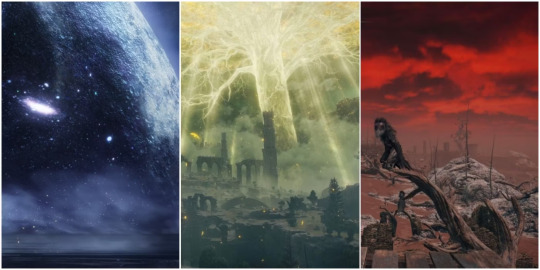
It amuses me how Elden Ring community by default made villains from the outer gods without any attempt to udnerstand them or their motives. Typical american/western audiences.
外なる神 is used in Japanese culture for lovecraftian beings, sometimes used interchangeably with "cosmic horror.” Nyarlathotep is a good example of an outer god. However, in Elden Ring deities with the obvious connection to the space - Dark, Full, Black Moons (celestial objects) and the Greater Will (nebula-like design of Elden Beast) are never described as such. Confirmed outer gods (Rot, Twinbird’s outer god of Death, Formless Mother) represent natural elements or processes: decay, bloom, birth, bleed and death.
On a different note, in the most Lovecraft inspired game made by Miyazaki, Bloodborne, the local equivalent of the outer gods, Great Ones weren’t evil. They were pitiful beings, who craved for children because they couldn’t have their own.
From Miyazaki’s Interview:In the world of Bloodborne, babies that are treated as “special” in one way or the other are offered as lures to the Great Ones. The Great Ones have all lost their children because of their positions, and as a result, they’re attracted to these ‘special’ babies. This story setup was something I came up with pretty readily in my mind. When it comes to living creatures, the stronger or more advanced you are, the fewer offspring you produce in your life. Even with human beings, the birth rates in more advanced countries lower, right? Looking back, I wonder if facts like that were at the root of the idea
(this theme of advanced beings having fertility issues continues in Elden Ring)
GRRM is also not a fan of good vs evil stories and gods being active participants in human wars.

What I’m trying to say with my poor English is that how come a collective project of two authors, who are notorious for subverting good vs evil tropes and aren’t using deities as major political players, is viewed like a Hollywood-esque story about good guy Tarnished, who saves the world from Ancient Evil and marries stunning and brave rebellious Queen or cute anime doll, both are holier than Jesus and saving the world from influence of the evil alien outer gods?
After all, who decided that people of the Lands Between need protection from the “evil” outer/ancient gods, when there are several occurrences of ostracized and wronged members of society asking for their help? Mohg, who was rejected by his biliogical mother, is coping with Formless Mother. Nomadic merchants summoned Flame of Frenzy after they were genocided by the same woman. Sage Gowry wanted to estabilish Order of Rot. The people of the Lands Between aren’t showing any particular concerns about outer gods, all intention to reduce their influence comes from Empyreans and gods, meanwhile, even the Greater Will accepts outer gods as a part of Order system.
But let’s return to the nature and motives of the outer gods. It’s a mystery. The most well documented outer god, Formless Mother, likes to be wounded.
The mother of truth craves wounds. When Mohg stood before her, deep underground, his accursed blood erupted with fire, and he was besotted with the defilement that he was born into
Sure, Mohg uses power of Formless Mother to estabilish his dynasty, but he is a raving lunatic after all. It’s never stated that Formless Mother herself wants to enslave humanity or influence it in any way. It’s a masochist god.
What about Rot? Or the outer god of Twinbirds?
Nothing.
Same goes for other entities. I can speculate that the Greater Will is about Order and evolution and the Frenzied Flame represents Chaos and want to melt influence of the Greater Will. But I can’t say anything about Moons or Fell God. There is not enough info.
My key point is that reducing outer gods to LE BAD aliens is not quite right. Or using them as a scapegoat to vilify hello, Malenia or whitewash certain characters looking at you Ranni and Marika simps. I have no idea why in Bloodborne, a game where lovecraftian gods were actively involved in the story and gameplay, community wasn’t so obsessed with painting them as evil alien invaders. Suddenly, in Elden Ring entities that a mentioned a few times in armor descriptions are the root of all evil because people are desperately craving for someone to redirect responsibilities from corrupted humans and gods.
154 notes
·
View notes
Text
Neverafter has been one of the craziest seasons of Dimension 20 on a lore level but there’s still a lot we don’t know about the true goals of the many villains or how they connect to each other. so I made this
LIST OF FORCES AND FACTIONS IN THE NEVERAFTER RANKED ON HOW LIKELY THEY ARE TO BE THE TRUE BIG BAD OF THE SEASON
(Updated through episode 8)
Mother Goose’s Book
While sucking people into the book at first appeared to be a thing that Timothy was unwittingly doing TO these people, I think it’s become clear that Tim is genuinely helping these people. Same with Scheherazade. I think the two of them are, pardon the pun, on the same page. And the rest of their two groups of adventurers are on the right trail to fixing the problems in their worlds. More or less.
The Big Bad Wolf
Listen I understand ranking him this early on the list may be controversial but like? If any of the villains of the original stories is as much a victim of the times of shadow as anyone else, it’s the Wolf. I do not think that a being representing Death and The End would be a true villain in this kind of world. That doesn’t make sense from what I understand of Brennan nor this world he seems to be building here. Plus like. We KEEP getting more and more hints of something bad happening to the wolf? And it’s not framed as a good thing? PLUS Ylfa’s storyline ending in her still rejecting, rather than accepting the part of herself that is the wolf doesn’t make much sense imo. All signs point to the Wolf being a positive, albeit hungry, force in this world.
The Spiders
Obviously they took up a combat episode but. Anything evil about Muffet has I think been dealt with at this point. Her and itsy bitsy are good guy creepy crawlies. No true evil here.
The Princesses
I’m pretty sure the princesses are also good guys. Cinderella definitely is. But they also seem to have their own goals and agenda that we don’t know much about? I’ll be MAD if they are all ultimately villains though.
Aesop
A little mean but he seems harmless. Mostly. Like the Fairies he seems to have a very specific way he thinks things SHOULD be, but his worldview seems very descriptive rather than prescriptive. He believes in morals very strongly because his world has informed that, not because he’s made it that way. But… enough of the similarities to some of the other villains are there that I felt I should rank him separate from the other storytellers. Like. Remember when his Lion just had blood dripping from his mouth as he said he didn’t know what he ate? Something’s fucked up with the realm of birds and beasts dude it’s not just me being wary of Lawful Good characters. Or maybe it is idk.
The Staff of Between the Lines
Its possible they may have unwittingly overseen some kind of revision to the narrative or held to some rules that have allowed corruption to take root. However I do believe that Key and Legend are good people doing their best to help, and the library itself seems to be a good thing in this world. (Or… outside of it?) At worst they’ve been somehow manipulated by darker forces to do evil in a way we do not yet understand.
Lord Bandlebridge
Member him? Imagine if plot twist he was the big bad the whole time lol. Shoeberg was always kind of a scummy place from what we’ve been told but seems ultimately unimportant to the big picture. Not a good guy. Probably not a villain we’ll see again.
The Fox and the Hare
Pib, while a little bastard, ultimately seems interested in upsetting established order in a way that benefits the small, poor, and kind people of the world. The other tricksters don’t seem to… get that? I think they play tricks for selfish reasons, and simply to cause chaos respectively. I think that’s why The Cat seems to be keeping the other two in check during the times of shadow. Because pure selfishness and chaos actually uplift the established order instead of subvert it now. They’re def not secretly the big bads or anything but I don’t think they’ll totally get what Pib is doing with Mother Goose. If they show up again there will be conflict I think.
Ogres, Witches, and Giants
We have yet to see any of these kinds of creatures but all three have been talked about and play roles in various characters’ backstories. I think, like Fairies and Princesses, they have their own goals for the world. But ultimately they’re probably also mostly victims of the narrative casting them as villains. Currently there’s no reason to think they’re anything more than symptoms of the Times of Shadow though. They’re not a real faction vying for control of the multiverse.
The Seven “good” Fairies and the one Wicked Fairy
We’ve only actually seen 3 fairies total. The Wicked one, the Godmother, and Turquina. We know there were 8 fairies at Rosamund’s birth (in the second timeline). Maybe there’s more fairies but if so, why are so many playing different roles in so many different stories? I don’t think this is a race of beings but rather a small group of incredibly powerful individuals who came together to bend the worlds of the Neverafter to their desires. And well. that’s bad, mmkay? They’re definitely not the good guys that most of them appear to be. But here’s the thing. They’re losing. They like the Happy Ever Afters. They like the smiles and the songs. They like the family friendly morals. And the times of shadow are fucking with all that. The fairies are definitely bad but I think they’re secondary antagonists to the rest of this list.
The Authors
I have three theories for the Authors.
they were meant to be implied lore, like The Bulb in ACOC. A thing that hangs over the story but ultimately exists outside of it. The implication that ACOC is inside a refrigerator is never directly acknowledged nor important to the plot. But in Neverafter, Ally rolled a nat 20 the one time that would result in us learning a fragment of this greater reality and Brennan went cosmic horror with it. If true, this theory means I’ve ranked these beings too far in this list, as they aren’t actually directly affecting the plot themselves. They write all stories and this is simply one of them.
The Authors are the true villains. Bad things happen to good people because that makes a good story and for good times to return, we must kill the Gods that wrought all suffering and create a new world on our own image, free of torment and pain. Or. Something. Idk killing beings that are essentially gods in this world seems a bit… JRPG? But maybe that’s where we’re going? If so I’ve not ranked these beings far enough in the list.
There is a near infinite number of these beings. But only seven have their eyes on this particular version of the Neverafter. Six have given their powers to our heroes. One has empowered all of their enemies. The fairies, tricksters, ganders and stepmothers alike. This one devil will never show his true face to the heroes, but instead, through these various factions, seeks to tear asunder the world of Stories the others have sewn together, and that the heroes seek to protect. The heroes won’t be able to fight a cosmic being, whose very words are gospel within this world. But empowered by these other Authors, they can defeat the parts of the narrative under his control. In this way these beings are not themselves the true villains, but rather like a force, without which no character has any agency. If this theory holds, then as a group they are ranked just right.
The Gander
The Gander and the Times of Shadow are one and the same thing. We’ve known this for a few episodes now. The bad times. The destruction of the narrative structure that dictates the rules of this very reality are coming undone. That is itself The Gander as I understand it. That said. I refuse to accept that the final boss will be a mean goose guy that grants wishes but at a price. That can’t be… it. Not in the Horror season. So as much as the Gander is cosmologically at the root of what’s going on, I think it is just a part of a more sinister whole.
The Stepmother
I wasn’t originally going to put her at the highest spot bc this seems too obvious but. she is currently the only person that really makes sense as an actual villain that can be fought AND is cosmically large and scary enough that she seems above everything else. There’s a lot of mean and scary things in the Neverafter but nothing so far is as mean and scary as the stepmother and the more we learn about her the harder it gets to really imagine that there’s something meaner or scarier than her waiting.
Prove me wrong, Brennan.
50 notes
·
View notes
Text
I think tonight, I’ll repeat why I think Edelgard is a great character.
Remember the phrase “would you kindly…”? It’s from Bioshock, a seemingly harmless little turn of phrase that, in reality, is a hypnotic trigger for your character. It doesn’t seem like much, but the game hammers it’s importance into your skull with it’s reveal. Your character has not been in control, you’ve been a puppet all throughout your vacation in Rapture. It also serves as a deconstruction of video games, how we don’t question the quests we’ve been given or even our own actions. We’re told “hey, you’re the good guy. Go do this.”
Edelgard does the exact same thing, just without the brainwashing…possibly. There may be something to her Crest of Flames. But all she does is feed the player her narrative. How rotten the world is, why it is, what needs to be changed and how she wants to do something about it. It starts sounding like this more traditional RPG tale, Edelgard against an evil Church.
But, as the devs said, the game world was built around supporting Silver Snow, it was built around the story where it turns out Edelgard is actually the villain the entire time. And while the execution is frustrating, to say the least, it does tie into the intent behind the game as well as it’s themes. Namely the Buddhist stuff I’m always harping on, how Byleth isn’t supposed to be led astray by their own ignorance while the player is supposed to immerse themselves into the setting.
Byleth is supposed to be a bodhisattva figure, being tempted through their attachment to Edelgard but ultimately not succumbing to it. The attachment is the big deal here, as it’s through it that Byleth can be led astray. The game references the story behind the Banner of Victory through Silver Snow’s save icon, Byleth’s flag which the devs called the game’s real Fire Emblem representing the faith people put in Byleth. Going down this route is framed as changing the story.
But is also means that the player is going down a path not supported by the world building. That they believe something else, and as a result mow down everyone in Edelgard’s way. This was stated to be the intended them of the route, like it’s charging that the player didn’t pay attention to the story and world. Yet at the same time, there’s still the little hints of world and character building that tells us this isn’t the heroic route we thought it would be. It’s all in the little details, the contradictions and the implications, and they all add up.
If the player doesn’t pay attention, Edelgard will play them like a damn fiddle and she doesn’t have to say “would you kindly.” She’s a villain who can convince people to join her in order to supposedly save the world. And if the player still isn’t paying attention, they’ll believe it.
Going back to Bioshock for a second, by the time you’re given your first moral choice (save or harvest the Little Sister), you’ve been in Rapture for a while. You’ve heard the ideology the city was founded on, seen it’s ruined state, and what the people have become. You’re still piecing things together, but you’ve seen enough. You’re given the choice, Harvest and kill the Little Sister for more ADAM, making yourself stronger by sacrificing others, or saving the Little Sister at the cost of that additional ADAM. The latter option goes against what Andrew Ryan founded the city on, you’re rejecting that ideology and telling him to shove his copy of Atlas Shrugged where the sun don’t shine. Or you buy into it, putting yourself above others like he would have wanted. Not simply a “good” or “evil” choice like many make it out to be.
By the time you’re given the option to join Edelgard, you should have seen enough already to see why it’s a bad idea.
And I just find that’s a pretty cool concept, even if it does weaken the recruited characters if you really examine it. Plus she looks like the Queen of Hearts out of an Alice in Wonderland production post-timeskip. Real “off with her head” vibes.
8 notes
·
View notes
Note
O HAY, I had a question for you: Triss? I really enjoyed her in TWN season 1 -- I thought it was interesting to have a sorceress who had implicitly rejected Aretuza's lessons about compassion being a weakness, etc, who had *chosen* to remain tender in a world that wanted to harden her. But then I met her in TW3, and found out about the SKEEVY dubcon shit she pulled with amnesiac-Geralt in TW1, and it seems like they took nothing of her character but the name for TWN?? So, book!Triss thoughts?
Hello my dear! So, I was holding onto your ask because I have every intention of doing a full Triss Merigold character breakdown like I did for Eskel and Milva and Aiden.
However, I'm taking so long getting to it that I figured I'd answer your ask and then just do my char sheet in slower time. (I'm working on Lambert first and I'm only like halfway through that).
So, Triss. Triss, Triss, Triss.
The thing that makes Witcher book characters feel so real is that they are complicated. They can be very nice but not a good person. They can be a good person, but not nice at all. They can be heroic to strangers, but shitty to loved ones. They can be devoted to their loved ones and brutal and inhumane with strangers. It's just like real life.
Triss in the books is undoubtedly heroic and very sweet. She represents the kind of person who believes that good can be done using the mechanisms of politics. She is a 'give a shit and get involved' person. A 'doing nothing in the face of evil is complicity' person. She gives incredibly moving and persuasive speeches to the wolves on helping people and getting involved. And she isn't just full of shit. She puts herself at risk. She sacrifices some of her most important tools of power (her 'perfect' beauty) and she shows herself willing to sacrifice her life on MULTIPLE occasions to rescue innocents and civilians. But her heroic values, take to the extreme, cause her to make some deeply (to me anyway) immoral decisions. The witcher will always show you the pitfall to every approach to trying to do good. In that way, she is no different than Geralt, on the opposite spectrum. His 'don't get involved' approach has it's shortcomings too.
Her sexual pursuit of Geralt can be interpreted on a whole spectrum. The phrase in the books about her 'use' of magic can be read literally or figuratively. Either way, he is clear that he is not interested in her romantically, but without a doubt she is dogged and persistent. Some people interpret that as messy and desperate. He does care deeply about her as a person, he did sleep with her, and she is very young. Yarpen in the books characterizes her actions as basically embarrassing to herself because she misunderstands Geralt's kindness as interest. He sees her as a person who is just taking Geralt's kindness the wrong way.
Other readers see it as sexual harassment. How many times can someone tell you no before it is seen as such? What else do you call an opportunist, who sleeps with an emotionally vulnerable person regardless of the literal/figurative interpretation of "magic". And why doesn't she just s t o p when she's been told to stop? Obviously, in real life, I would call that sexual harassment. But of course we aren't talking about real life.
I think the show interprets her actions towards Geralt in a way that is complimentary to her character. She takes no for an answer in the scene in TWN. I also think Anna Shaffer does a beautiful job portraying her sweetness and kindness and heroic nature, and the script hasn't really had her do the things that make people think of her as predatory. I also think the shit Anna has gotten for existing while being a woman of color is absolutely revolting, and she portrays the version of Triss that is by far the easiest to love with your whole chest. (the books purposefully make you struggle to find a 'perfect' person you can unreservedly love)
I haven't played the games, but if Triss takes advantage of his amnesia, then clearly the game makers interpret her the other way, as a person who is predatory (whether they think that story line is predatory or not, I think we can agree that lying to an amnesiac is predatory)
I think depending on the story you want to tell, you can stretch that depiction either way, using the source material.
The other question is, what kind of friend is she? Throughout eight books, you see her think admiring things of Yen, worry about Yen, and speak highly of her. Regardless, she sleeps with Geralt knowing full well and having been explicitly told that he loves Yen and that he is with her.
So, in my view, she is a terrible friend to Yen. I don't think there is any doubt about that. I mean, some people may think sleeping with a friend's partner is cool, I do not.
So. It's complicated. I love Triss's character because I think she plays an incredibly important role developing the most important witcher themes. I relate to her political approach, seeing as I believe in organizing for the betterment of regular people. (Though I think it leads to some horrible decisions)
And regardless of her breaktaking betrayals, she always has her reasons, and Geralt never really stops seeing her as a friend, and neither does Ciri. It's almost like family that way. They can be absolute nightmares, but they are your nightmare. But Yen never forgives her for turning her back on Geralt and Ciri when the chips are down. In fact, the scene where Yen tells her she will never forgive her gives me fucking chills. It is so powerful a scene.
Yen is real one. She is a real ass bitch who will fight a god for her family. Someone like that cannot fathom how Triss can make the choices she makes, no matter how lofty or virtuous the motivations.
And I'm with Yen on that one. It is infuriating watching her hurt Yen over and over and over and seemingly just not care. It's devastating to see her leave them out there at risk.
So. It's complicated. It's a little from column A and a little of column B. But to be fair, almost every witcher character is like that. They do heroic, admirable, touching, kind, beautiful things. Then they turn around and do something that is just reprehensible. It's why they feel so real.
But Anna Shaffer is my fave Triss and when I put Triss in fics I'm always picturing her and her lil freckles.
34 notes
·
View notes
Text
Wheel of Fortune & FE3H
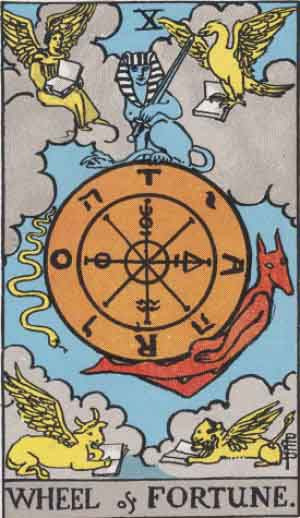
The Wheel of Fortune is meant to show the ever-changing nature of life as it goes through ups and downs. Our own position in life relative to others can evolve and flip as fate brings us to dizzying heights or the darkest lows. The Wheel of Fortune seems to be telling us, nothing is permanent, and we should cherish each and every moment.
Some things I notice are the blue sphynx sitting atop the wheel, appearing to adjudicate the spin with her vast knowledge and wisdom. Anubis in devil form slips alongside the bottom, representing death, and the serpent slithers close by, representing both evil and the forces of life. What I find most interesting are the four living creatures sitting in the clouds with books in their hands (perhaps another reference to the Torah?). They are believed to hold up the throne of God in Jewish and Christian mythology, so perhaps the wheel itself is a throne? Also, the animals being man, ox, lion, and eagle are very close to the three (really, four) houses of Fire Emblem: Three Houses. Man being perhaps the church as they look like angels, and ox being a deer, transformed from humble work animal to mythical wild game.
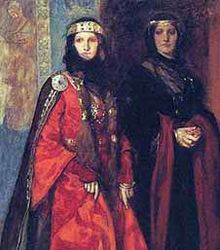
The crest associated with the Wheel of Fortune is the Crest of Goneril. The name itself harkens to the oldest daughter of King Lear. She is arguably the most evil of the antagonists in the play due to her backstabbing nature. Every alliance she forms in the play is dissolved by her hand, including the ones with her sister and her husband. In the end, she takes her own life when Edmund rejects her.
The dragon associated with this crest is the Kalpa Dragon. This one is probably the most oddly specific of the dragon names. A kalpa is a very long period of time in Buddhism, similar to an aeon, though probably longer. Considering the strong themes of Buddhism in the rest of Fire Emblem: Three Houses, this is not a surprise. It is believed that at the end of each kalpa, the world is annihilated and reborn.
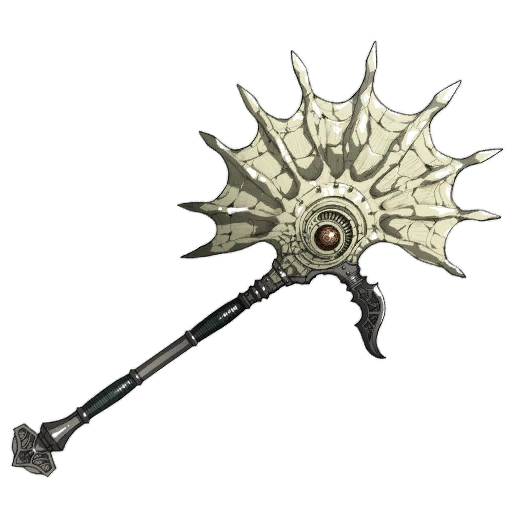
My personal opinion is that the Kalpa Dragon, just like the Wheel of Fortune itself, has no definite form. It may sometimes be shaped like a wheel, but from a different angle, it appears to be a different shape altogether. That’s what made the Kalpa Dragon so terrifying, because it seemed to embrace multiple contradicting forms. It must have been a mysterious dragon, with the relic only making use of one part (perhaps fins?) of its massive being.
The character I choose to connect to all these things is Hilda Valentine Goneril. She appears to have a carefree nature, happy to take her spin on the Wheel of Fortune, but she’s actually terrified of how people view her. While she appears to embrace the motto of the Wheel of Fortune, she truly hasn’t yet. All the same, she encourages others in her life to let go of preconceived notions and go with the flow more.
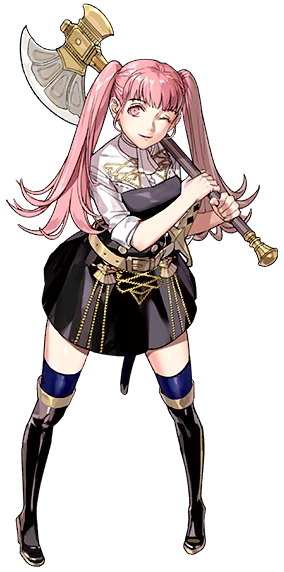
As with the rest of the Golden Deer who are named after King Lear characters, Hilda also seems to embody the reversal of the character she’s named after. While Goneril breaks alliances and backstabs at every opportunity, Hilda is able to form many alliances with the Golden Deer and those in other houses. She is also loyal to Claude to the end, much to his surprise.
For the Kalpa Dragon… I’ve got nothing. I can only see a loose connection between a kalpa and the Wheel of Fortune. Over the course of existence, anything can happen, and in the end, it didn’t matter anyway.
Previous: The Hermit
Next: Justice
#fe3h#fe16#tarot cards#major arcana#wheel of fortune#crests#crest of goneril#kalpa dragon#goneril#king lear#shakespeare#hilda valentine goneril#freikugel
8 notes
·
View notes